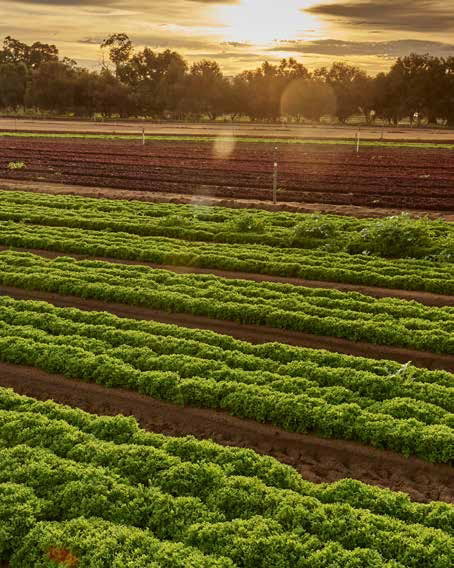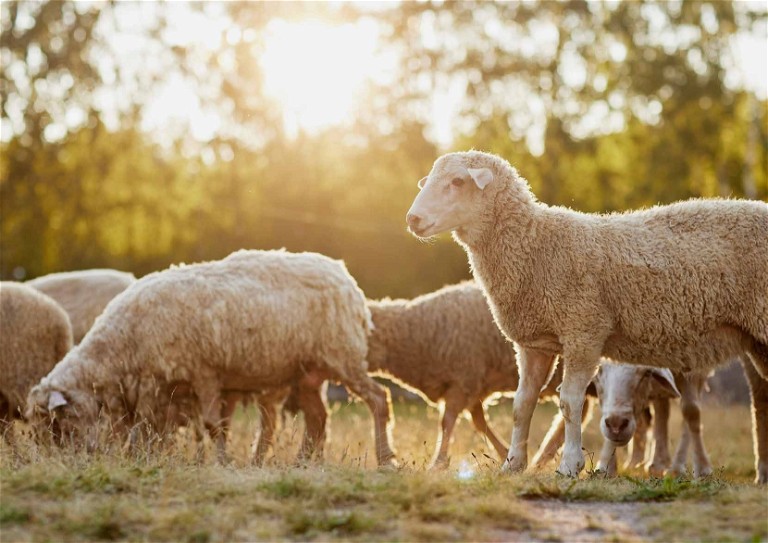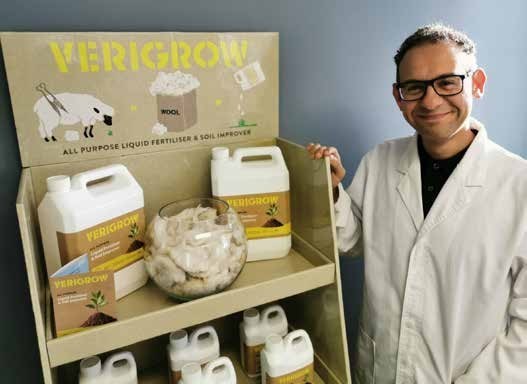innovation
GREEN chemistry
Dr Ramiz Boulos is leading the charge in sustainable farming innovation for horticulture with world-leading wool-based products that work as a full plant- and soil-health system.
Words Anna Flanders, vegetablesWA


“ The key innovation in our wool-based products is how to unlock the goodness of the wool to exploit that in various plant- and soil-health applications ”
IT’S no secret that horticulture is attracting some of the leading minds in the world. Artificial intelligence and robotics are moving into our paddocks, soil research is a hot topic and the age of chemical intervention seems to be phasing out as we learn more about microbial environments and bacteria. One such person leading the green chemistry charge in global soil advancements is Perth-based scientist Dr Ramiz Boulos of Veratin.
From his background in chemistry and research into keratin, he has developed a world-first soil system under his company’s Verigrow brand. This system utilises protein-derived amino acids sourced from lowgrade wool to create soil fertiliser, improver, supplements and wetter. Phosphorous and fully organic products will soon be released to round out the system. Results from lab and broadacre trials are exciting.
“We are currently conducting broadacre wheat trials in Katanning with a group called Primary Agronomy. Previous broadacre trials on wheat conducted by Primary Agronomy have revealed that Verigrow outperforms traditional nitrogenbased fertilisers, especially when considered on a per unit of nitrogen basis.
“We are also conducting longitudinal studies to understand how the soil environment changes with prolonged use of Verigrow. In the horticulture space, we have previously completed studies on tomatoes with an independent company. We saw two to five times improvement on every single parameter we measured when compared with a marketleading brand,” says Ramiz.
vegetablesWA and WA Grower magazine is excited to partner with Veratin to perform demonstrations and trials with growers in Western Australia to look at the performance of this circular economy product on soil health, crop yield and taste. It will be trialled on leafy greens, broccoli, tomatoes and fruit trees.
“It’s a win for the environment. It’s a win for the farmer. And it’s a win for us,” says Ramiz of utilising what’s regarded as waste wool. “The key innovation in our wool-based products is how to unlock the goodness of the wool to exploit it in various plant- and soil-health applications.”
Wool is composed of up of 95 per cent protein – keratin protein – and all protein is made from amino acids. Amino acids are known to play a number of crucial roles in plant health, such as:
“ We saw two to five times improvement on every single parameter we measured when compared with a marketleading brand ”
• Improving the chlorophyll levels of a plant. This means a plant can photosynthesise better, which increases its sugar levels. This should improve BRIX levels, making fruit and vegetables sweeter.
• Feeding micro-organisms. If amino acids are added to soil it will provide the nutrition needed to build levels of beneficial micro-organisms, creating a soil rich in organic matter.
• Saving energy on creating amino acids. By adding our amino acids, plants can save energy they would usually spend on creating amino acids. This means they can use that energy for other purposes. This means plants are able to use less traditional NPK fertilisers, reducing your environmental footprint and costs.
So who is Dr Ramiz Boulos? He came to Australia in 1999 at the age of 17 as a humanitarian refugee from Sudan with his family. Studying science at the University of Western Australia (UWA), he majored in chemistry and genetics, then spent several years at UWA on various projects across antibiotic drug development, biomass utilisation and nanotechnology. He completed a doctorate in creating a new class of antibiotics (stemming from work in drug resistant bacteria), then went to Flinders University in South Australia where he did more postdoctorate projects and studies. However, returning to WA, it was his work in biomass utilisation that started him on his journey into the agriculture industry.
“I became interested in biomass utilisation and keratin-rich environments, such as human hair. So I shaved my head, walked into a lab with a bag of my hair and started doing some experiments on ways to essentially unlock the goodness of keratin-rich materials,” he explains. “It started with human hair, then wool came into the picture. I very quickly became aware of low-grade wool, which farmers struggle to sell. So that is what we now buy direct from farms for our products.”
Verigrow was launched into the Australian market in October 2019. Veratin was listed on the NSX in 2022 and will be moving to the ASX next year. The Verigrow innovation is a world-first and Veratin has patents in several countries, with more pending. “We focus and invest heavily on intellectual property,” explains Ramiz, who has plans for more launches, including wool polymer pots that feed a plant as it grows and decrease the amount of water needed for growth.
Verigrow can be used with existing products or the suite of products can be used together as a complete system – soil fertiliser and soil improver, supplements, phosperous and soil wetter.
“The importance of natural-based or bio-based products for soil health is only going to grow and increase. We’re very fortunate we can capitalise on that movement because we’re ahead of the game. It is beneficial for the microorganisms for the soil structure, and many other things, without destroying or modifying the PH of the soil too much,” says Ramiz.
And is there anything he wants to pass on to the farmer? “I want farmers to really think about the long-term benefits and the additional costs up front of switching to this type of system versus no investment in these new products and the cost of long-term unsustainable farming. Verigrow is a product that speaks to results. We believe farmers will see faster growth, improved yields and better soil quality. And we’ve had a lot of evidence on worms returning. And that’s always a very good sign of soil health.”

Scientist Dr Ramiz Boulos is a leader in green chemistry for plant and soil health.
MORE INFORMATION
Visit veratin.com.au or verigrow.com.au. The products are for homeowner and commercial use, and are sold in commercial quantities.
Trial Partnership
Veratin and WA Grower/vegetablesWA has teamed up to create a series of trials over 2024. We will be releasing the statistics from these trials through WA Grower. “We are excited to team up with Veratin to bring this type of world-leading innovation to our farming community,” says Stephen Brown, vegetablesWA CEO. Watch for the release of trial results over the next 12 months, and get in contact with us at comms@vegetableswa.com.au if you would like to learn more about this product, or speak with Veratin about testing the products on your crops.